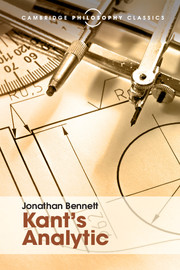6 - The metaphysical deduction
from Analytic of concepts
Published online by Cambridge University Press: 05 July 2016
Summary
Concepts and judgments
The Analytic of Concepts consists of two chapters. One is entitled ‘The Clue to the Discovery of all Pure Concepts of the Understanding’; but I shall follow the universal practice, based on one passing remark of Kant's, of referring to its main line of argument as the Metaphysical Deduction of the Categories. The second chapter bears the equally repellent title ‘Transcendental Deduction of the Categories’. In the first chapter Kant lays down certain conditions which he thinks must be satisfied if one is to use concepts; and in the second he argues that only someone who uses concepts can have experience, because experience must be ‘gone through in a certain way, taken up, and connected’ by the understanding. In this section I shall examine certain assumptions which lie behind the Metaphysical Deduction of the Categories.
Someone counts as having the concept of humanity if he can correctly use ‘human’ and its cognates, or ‘menschlich’ and its cognates, or ‘humain’ and its cognates etc. In saying this I treat concepts as abilities rather than as mental states which may lead to abilities: a man's ability to use a word properly does not merely suggest but proves that he has the corresponding concept. I thus desert the introspectionist approach to concepts which, as I noted in §2, Kant often adopts when he is discussing analyticity; but then Kant himself usually deserts this too. The Analytic of Concepts is, I think, intelligible only on the assumption that to have a concept is to have a certain sort of linguistic skill. The question of whether there can be a non-linguistic exercise of concepts will be discussed in §24.
Someone who uses ‘human’ and its cognates correctly, i.e. in accordance with standards which are accepted by most literate speakers of English, is said to understand these words or to know what they mean. Someone who does not know what ‘human’ means may (1) have no use for ‘human’ or (2) have a use for ‘human’ but a wrong one. The two cases are very different: in type-(1) cases, standards of correctness are crutches for beginners; in type-(2) cases they are correctives for fumblers.
- Type
- Chapter
- Information
- Kant's Analytic , pp. 75 - 88Publisher: Cambridge University PressPrint publication year: 2016

